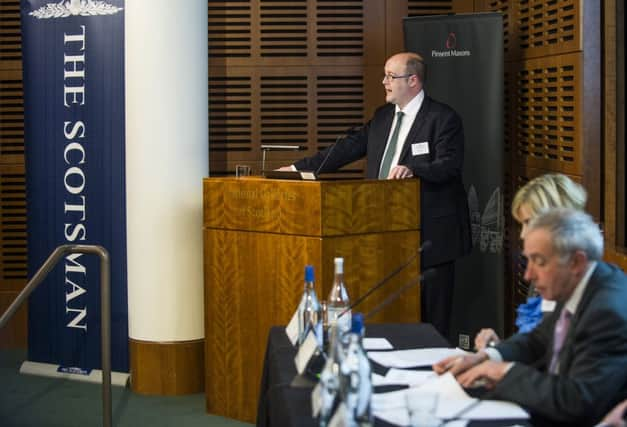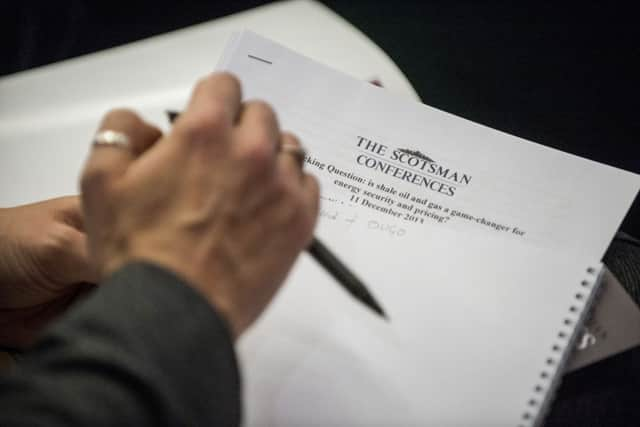Scotsman fracking conference: planning reform call


Speaking at a Scotsman conference examining the shale gas revolution, Professor Gordon Hughes of Edinburgh University claimed the planning system is weighted in favour of developers rather than those affected.
As the Scottish Government faced calls to allow the exploitation of unconventional gas reserves, Prof Hughes contrasted the Scottish planning system with the one in the United States, which remunerated locals for upheaval.
Advertisement
Hide AdAdvertisement
Hide AdDiscussing the way energy tax revenue was distributed in the UK, Prof Hughes claimed communities were disadvantaged by a “rotten system”. He said: “The difference between us and the US is, who enjoys the benefits and how are they distributed.


“Do we give much more back to local landowners, residents and so forth, or do we allow a situation in which the UK government takes most of the money?”
Prof Hughes said there was a “limited provision” to compensate people who felt development had devalued their assets.
“We have a process which is quite lengthy and difficult, but essentially says the interests of economic development, climate change, whatever it is, outweigh the people who are affected because their houses are affected or their landscapes ruined.
“The consequence of all that is that there is a very strong incentive to resist by any means you can construct to do that.


The conference, sponsored by law firm Pinsent Masons, also heard from Duarte Figueira, head of the Office of Unconventional Gas and Oil at the Department of Energy and Climate Change; John Ireland of the Scottish Directorate for Energy and the Environment; and former Dana Petroleum chief executive Stuart Paton.
Conservative MSP Murdo Fraser urged the Scottish Government not to lose out on the shale gas revolution.
A plan to drill for coalbed methane in the Forth Valley, proposed by Dart Energy, is currently subject to a planning appeal to the Scottish Government.
Advertisement
Hide AdAdvertisement
Hide Ad“The move towards shale gas is accelerating, and we need to see action now from the Scottish Government to make sure we don’t get left behind,” Mr Fraser said. “The UK government is making the right noises on this, and Holyrood needs to follow suit. Not only could shale gas guarantee energy supplies for decades, it could also bring a huge boost to the economy.”
Jennifer Ballantyne, Glasgow-based partner at Pinsent Masons, said a number of financial incentives are already on the table for local communities.
“The developers have done their part and, through UKOOG [UK Onshore Operators Group] agreed the parameters of payments they will make,” she said.
“There is a commitment to pay communities £100,000 in relation to each ‘fracked’ well and a payment of at least one per cent of revenue – not profit, but revenue – during the production stage of shale gas extraction.”
A Scottish Government spokesman said: “The Scottish Government will take a responsible, evidence-based approach to the development of an unconventional oil and gas industry, and will listen to the views of communities.”
Ignite our coal seams, says Scots oil baron
A SCOTS oil baron has warned that a new energy crisis is inevitable unless controversial plans to ignite coal seams off the Fife coast are explored, it was revealed yesterday.
Algy Cluff, who owns Cluff Natural Resources, wants to secure a contract to carry out Underground Coal Gasification (UCG).
UCG is a process whereby coal that cannot be mined because the seams are too deep, thin or fractured, is turned into gas underground before being pumped back to the surface.
Advertisement
Hide AdAdvertisement
Hide AdOxidants are pumped down to the coal seams, which are then set on fire.
By controlling the amount of oxygen injected it is then possible to only partially burn the coal and bring the gases produced to the surface, where they can be burned to produce energy
Speaking at a public meeting at the Fife Renewables Centre in Methil, Mr Cluff said utilising UCG to ignite coal underneath the Forth was safe, and essential to ensuring Britain’s energy independence in years to come.
NEXT SCOTSMAN CONFERENCE: The Digital Fabric of Scotland - The challenge of stitching it together